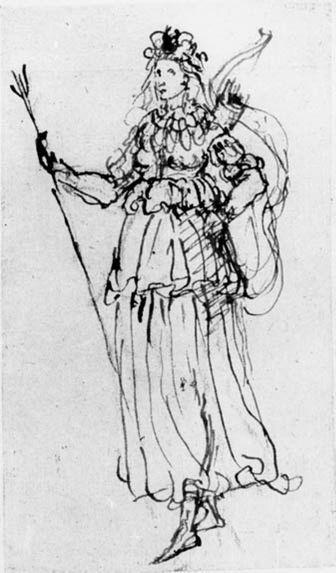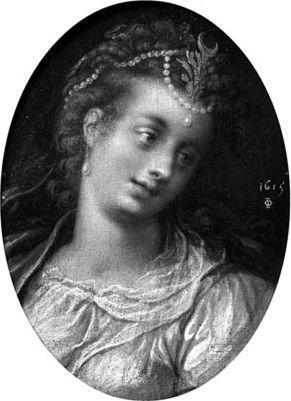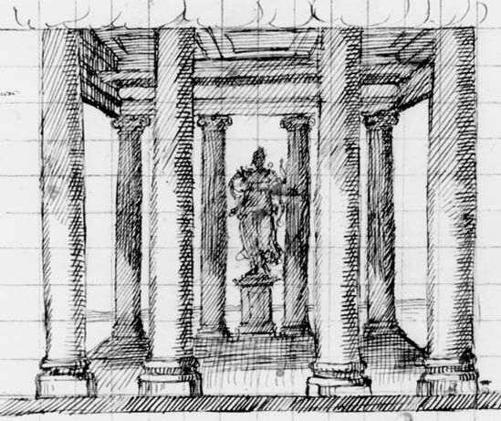
20. A miniature of Diana by Isaac Oliver (1615): the dress is yellow, the scarf a gauzy pink-white, the cloak over her right shoulder blue; the leaf-shaped brooch topped by the crescent moon, gold. In Samuel Daniel’s masque The Vision of the Twelve Goddesses (1604), ‘Diana, in a green mantle embroidered with silver half moons, and a crescent of pearl on her head, presents a bow and quiver’ (sig. A5). The ‘crescent of pearl’—an ornamental crescent moon, also detectable in Jones’s sketch—can be seen in many emblematic representations of the goddess.

21. For the pastoral Florimène (1635), Inigo Jones designed two scenic views of ’The Temple of Diana’ (see 1. 22.17.1). Though such scenes were not used in the public theatres in Shakespeare’s time, the columns supporting the overhanging roof of the public stage (see General Introduction, pp. xxvii-xxix) could have created a scenic effect roughly similar to Jones’s recessed classical temple. Statues were also available as props in the public theatre; in Pericles, as in The Winter’s Tale, the statue could have been impersonated by an actor on a pedestal. Whether or not a statue was visible, the temple could be identified by an altar (as in The Two Noble Kinsmen).

THE PERSONS OF THE PLAY
John GOWER, the Presenter
ANTIOCHUS, King of Antioch
His DAUGHTER
THALIART, a villain
PERICLES, Prince of Tyre
MARINA, Pericles’ daughter
CLEON, Governor of Tarsus
DIONIZA, his wife
LEONINE, a murderer
KING SIMONIDES, of Pentapolis
THAISA, his daughter
Three FISHERMEN, his subjects
Five PRINCES, suitors of Thaisa
A MARSHAL
LYCHORIDA, Thaisa’s nurse
CERIMON, a physician of Ephesus
PHILEMON, his servant
LYSIMACHUS, Governor of Mytilene
A BAWD
A PANDER
BOULT, a leno
DIANA, goddess of chastity
Lords, ladies, pages, messengers, sailors, gentlemen
A Reconstructed Text of Pericles, Prince of Tyre
Sc. 1 Enter Gower as Prologue
GOWER
To sing a song that old was sung
From ashes ancient Gower is come,
Assuming man’s infirmities
To glad your ear and please your eyes.
It hath been sung at festivals,
On ember-eves and holy-ales,
And lords and ladies in their lives
Have read it for restoratives.
The purchase is to make men glorious,
Et bonum quo antiquius eo melius.
If you, born in these latter times
When wit’s more ripe, accept my rhymes,
And that to hear an old man sing
May to your wishes pleasure bring,
I life would wish, and that I might
Waste it for you like taper-light.
This’ Antioch, then; Antiochus the Great
Built up this city for his chiefest seat,
The fairest in all Syria.
I tell you what mine authors say.
This king unto him took a fere
Who died, and left a female heir
So buxom, blithe, and full of face
As heav’n had lent her all his grace,
With whom the father liking took,
And her to incest did provoke.
Bad child, worse father, to entice his own
To evil should be done by none.
By custom what they did begin
Was with long use account’ no sin.
The beauty of this sinful dame
Made many princes thither frame
To seek her as a bedfellow,
In marriage pleasures playfellow,
Which to prevent he made a law
To keep her still, and men in awe,
That whoso asked her for his wife,
His riddle told not, lost his life.
So for her many a wight did die,
⌈A row of heads is revealed⌉
As yon grim looks do testify.
What now ensues, to th’ judgement of your eye
I give, my cause who best can justify. Exit
⌈Sennet.⌉ Enter King Antiochus, Prince Pericles, and ⌈lords and peers in their richest ornaments⌉
ANTIOCHUS
Young Prince of Tyre, you have at large received
The danger of the task you undertake.
PERICLES
I have, Antiochus, and with a soul
Emboldened with the glory of her praise
Think death no hazard in this enterprise.
ANTIOCHUS Music!
Music sounds
Bring in our daughter, clothèd like a bride
Fit for th’embracements ev’n of Jove himself,
At whose conception, till Lucina reigned,
Nature this dowry gave to glad her presence:
The senate-house of planets all did sit,
In her their best perfections to knit.
Enter Antiochus’ Daughter
PERICLES
See where she comes, apparelled like the spring,
Graces her subjects, and her thoughts the king
Of ev’ry virtue gives renown to men;
Her face the book of praises, where is read
Nothing but curious pleasures, as from thence
Sorrow were ever razed and testy wrath
Could never be her mild companion.